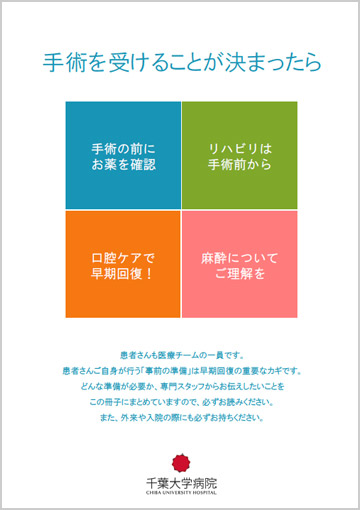Information for Patients
Explainer videos: When your operation is scheduled

With the videos below, we explain about preparations a patient should make before undergoing an operation. Please also refer to a booklet titled "When your operation is scheduled," which we provide to patients receiving an operation.
About playing the videos
- Click the play icon at the center of the screen.
- To stop the video, click the stop icon at left bottom.
- When the video playback is finished, the list of videos on Chiba University Hospital's YouTube official channel appears.
- When playing the video once again, please click the replay button.
About preparations before an operation to be made by a patient
Confirmation of medicines before an operation
One of our pharmacists will check the medicines that a patient is taking before an operation. To allow the pharmacist to check the medication smoothly, please bring your medicine notebook or medicine manuals. (Playback time: about 3 minutes)
Confirmation of medicines before an operation (text version)
Rehabilitation before an operation
After an operation, a patient can develop complications if he or she cannot spit out phlegm, which can increase due to lying continuously on the bed for a long time. Our rehabilitation doctor and physical therapist will instruct a patient on how to breath and do exercise before an operation so that he or she will be better able to spit out phlegm and take a walk soon after the operation. (Playback time: about 2 minutes)
Rehabilitation before an operation (text version)
Recovering early with oral care!
Patients are susceptible to germ infections after an operation due to declining physical strength and immune function. So we recommend patients to start oral care before the operation to keep oral hygiene. Doing so could prevent post-operation complications, help early recovery and result in early discharge from the hospital. (Playback time: about 3 minutes)
Recovering early with oral care! (text version)
Understanding anesthesia
Before an operation, anesthesiologists and operation room nurses will confirm a patient's condition and the operation procedures and then study how to adequately manage the whole body and anesthesia during the operation. Please gain understanding about anesthesia before an operation. (Playback time: about 3 minutes)
Understanding anesthesia (text version)
Rehabilitation before an operation
After an operation, a patient can develop complications if he or she cannot spit out phlegm, which can increase due to lying continuously on the bed for a long time. Our rehabilitation doctor and physical therapist will instruct a patient before an operation on how to breath and do exercise so that he or she will be better able to spit out phlegm and take a walk soon after the operation.
Breathing exercise
The exercised involves the stretching of the neck, shoulders and around chest while taking deep breaths to improve one's flexibility and breathing function. (Playback time: about 2 1/2 minutes)
Breathing exercise (text version)
Abdominal breathing
The breathing practice involves deep breaths and the use of the diaphragm to stretch the lungs to prevent pneumonia and atelectasis (complete or partial collapse of the lung) after an operation (Playback time: about 1 minute).
Abdominal breathing (text version)
Practice to spit out phlegm (huffing and coughing)
It is important to spit out phlegm after an operation. There are some tips to do this well. Prior practice is highly recommended. (Playback time: about 1 1/2 minutes)
Practice to spit out phlegm (huffing and coughing) (text version)
Stretching
This is designed to build muscle and physical strength to allow a patient to do walking practice easily after an operation. The stretching before walking practice will loosen up muscle and make blood circulation better. (Playback time: 1 1/2 minutes)
Muscle strength training, conclusion
The training involves several types of exercises with 15 rounds as one set to make the muscles big and strong. A patient can start with one set for each exercise a day, but is encouraged to eventually do two or three sets a day. Before being admitted to the hospital, one is encouraged to do about 20 minutes of walking or other exercises that result in mild shortness of breath. (Playback time: about 3 1/2 minutes)

